Here’s the bike news from around the world that caught our eyes this week:
Winter riding: It’s possible that today’s the end of this winter’s coldest snap, but it’s not too late to become a winter biking expert.
Happiness machines: The many benefits of bikes include slowing the aging of skin, getting you to sleep promptly and separating you from air pollution compared to car use.
Syrian freedom: “Bike sales are exploding” in Damascus, as Syrians “have turned to bikes en masse to avoid the endless traffic jams caused by hundreds of army checkpoints.”
Lawsuit specialists: “A Canadian veteran of the Afghanistan war who operates a tiny bicycle shop in Cochrane is being forced to change his store’s name after being threatened with a lawsuit” from bike manufacturer Specialized, which claims it has trademarked the name “Roubaix” for one of its bikes. (It’s a region in France that’s home to a famous bicycle race.) As we reported in 2006 and 2010, Specialized seems to do this sort of thing regularly.
Bike share placemaking: In NYC, Citi Bike stations are providing more than just transportation. People are using them for on-street public seating, rendezvous points and interaction hubs, all from “the space that would have otherwise been used to store a couple of empty cars.”
Banning exercise: Two cities named Charlotte are protecting their children by banning from city streets dangerous activities such as playing basketball or riding bicycles.
Total safety: The almost daily drumbeat of road deaths has convinced a TV anchor in New York City that Vision Zero, a policy that aims to use road design to eliminate them, is “a fight worth having.”
Suburban calm: The “safest suburb in the world” got that way by building “two separate transportation networks.” The city of 44,000 suffered exactly one traffic fatality between 2001 and 2005.
Gas tax hike: U.S. Rep. Earl Blumenauer (D-Portland) wants to add 15 cents per gallon to repair roads and build new infrastructure. It’d be the first such increase in 20 years, during which time the market price of a gallon has risen $2.20.
Car-centric London: London’s lack of separated bike infrastructure is “laughable,” says the celebrated Copenhagen architect Jan Gehl, and therefore its bike share system isn’t safe.
License requirements: A British driver’s license is “basically a Ph.D. in driving,” while American driving tests are “a joke,” writes an American in England.
Harmful protest? Londoners’ hugely successful protest for bike safety risks “creating a climate in which the public believe that cycling is becoming ever more dangerous in London,” even though the city’s fatality rate keeps falling. The demonstrations “could actually be making cycling less safe in London.”
Copenhagen backlash: “‘Bully cyclists’ have created an atmosphere of fear and intimidation for people on foot,” according to the chairman of the Danish Pedestrian Association. (That didn’t stop a pro-bike candidate from winning a local election for last month for “traffic mayor,” though.)
Safety gap: People on bikes and foot account for 15% of annual average U.S. traffic deaths, a recent study found. In car-bike collisions, people were using bikes legally 89% of the time and people in cars are at fault 87% of the time.
Electric hybrid: Is it a bicycle? Is it a motorbike? Something in between, according to Bruno Greppi, the co-founder of Cykno.
E-bike ban: NYC’s government is in hot water over a new law banning the use of electric bikes by businesses or their employees.
Street grid science: On Strongtowns.org, Andrew Price looks closely — very closely — at six different street grid patterns, including Portland’s, and offers revealing insights about the cities each one creates.
Black Friday parking: “If you want to build a strong town, get rid of your parking minimums,” writes Chuck Marohn in a photo essay ridiculing the amount of land devoted to auto parking that’s useful on one day every year. “Any chaos that ensues will be healthier for your city than the acres of unproductive, wasted space we have justified with a veneer of professional expertise.”
Pro-bike smackdown: “Just as it would be inefficient to force travelers to walk or bike for trips most efficiently made by motorized modes, it is inefficient and unfair to force travelers to drive for trips most efficiently made by active modes,” writes Todd Litman in a total demolition of most arguments in favor of car-dependent cities. I especially like his calculation that building Portland’s 2030 bike plan would cost “$6 to $25 annually per capita, a small fraction of the approximately $665 per capita spent annually on roadways.”
Cargo bikes: It’s the Associated Press’s turn to notice that these are a thing.
Driverless car horrors: The national passenger rail lobby grasps for every possible argument against driverless cars, including reduced automaker profits and increased obesity, without bothering to consider the effects of reduced car ownership.
Outrage shortage: Last week’s awful New York train derailment that killed four, injured 60 and got wall-to-wall news coverage and investigative resources was dwarfed by the little-noticed death toll of local street systems.
Indoor parking: Bike theft is a significant barrier to biking, and the infrastructure that fixes it is secure indoor parking, says newspaper coverage from Vancouver BC.
Biking gadgets: Laser-projected bike lights, snap-on electric assists, airbag-style helmets: all part of a boom in cool bike gadgets, but maybe a “distraction” from the supposed need for “hard segregation” to improve safety.
Easy e-bike: The 12-pound, $700 Copenhagen Wheel, which snaps into your rear dropout and gives your bike a smartphone-connected electric assist, is now on sale, and it’s worth a couple minutes as your video of the week:
If you come across a noteworthy bicycle story, send it in via email, Tweet @bikeportland, or whatever else and we’ll consider adding it to next Monday’s roundup.


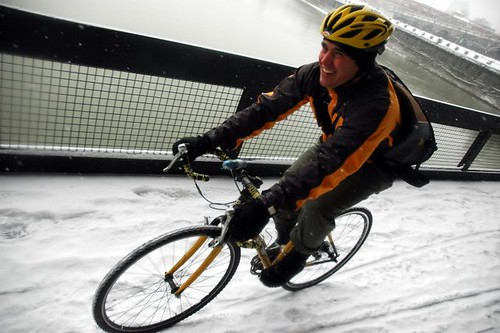
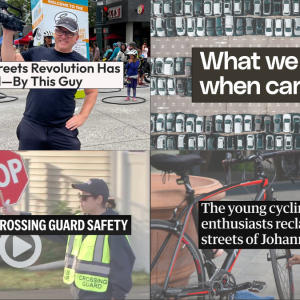
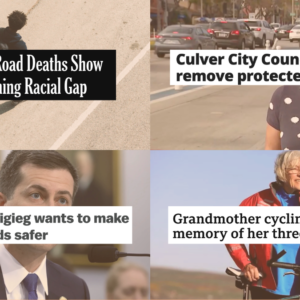
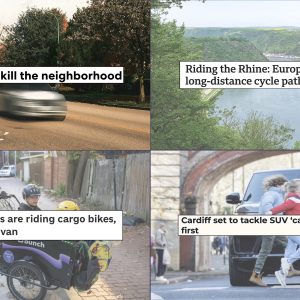
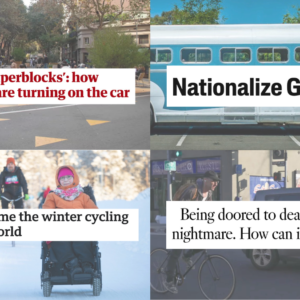
Thanks for reading.
BikePortland has served this community with independent community journalism since 2005. We rely on subscriptions from readers like you to survive. Your financial support is vital in keeping this valuable resource alive and well.
Please subscribe today to strengthen and expand our work.
The Copenhagen Wheel video is pretty amazing.
If it can withstand potholes, whether, theft, etc, and the price drops as production costs drop, I can’t imagine there not being 1000s of cargo bikes with these in Portland very soon.
Need to look at the terms and conditions specified in the trademark registration that Specialized acquired for its business, associated with the name ‘Roubaix’, but the bike products company seems to be over the top and out of line in thinking it is being infringed upon by Cafe Roubaix Bicycle Studio owner Dan Richter’s use of the name ‘Roubaix’ in his store’s name and on the custom wheels he builds.
I’m not familiar with the bike named ‘Roubaix’, the story mentions that Specialized has in its product line. I am aware though, of a line of very nice bikes that bike company Fuji makes, that are named in part using the name ‘Roubaix’. Link to Performance Bicycles website page for one of the models they sell: http://www.performancebike.com/bikes/Product_10052_10551_1135332_-1_400315__400315
I wonder if Fuji had to work out a deal with Specialized, to use the name ‘Roubaix’.
https://twitter.com/thebikeshow/status/409627941320937472
Dave Miller, Nick Skaggs, Bill …thanks for providing info on Fuji, Specialized, and their arrangements related to use of the name ‘Roubaix’. Some of the people commenting to the linked story, mentioned this also. This situation seems to be bewildering for many people, in addition to Cafe Roubaix Bicycle Studio’s owner.
Looks like Specialized got caught by ASI inappropriately trademarking in Canada. http://bicycleretailer.com/north-america/2013/12/09/asi-says-calgary-bike-shop-can-use-roubaix-name#.Uqa0uvRDt8E
ASI is trying to reach the owner and let him know he is good to go.
Paula…thanks for posting the news on this issue, and the link to a good article that provides explanation about it from ASI’s CEO, Pat Cunnane.
Still, though ASI will not contest shop Dan Richter, Cafe Roubaix Bicycle Studio owner’s use of the name ‘Roubaix’ in his store’s name, ASI’s CEO does state that his company owns rights to use of the name, and “…will need to license his use…” of the name. Next question I suppose, could be what the terms of that agreement will consist of.
And more recently, snagged via bikeportland’s twitter sidebar:
‘Tweets
Café Roubaix @CafRoubaix
I had a great conversation with Mike Sinyard today, and I am happy to let everyone know that things will be working out fine.’
Complicated, but very interesting. Glad the situation is working out for Café Roubaix’s owner.
Links to a couple more interesting stories relating to trademark registration and some of the impact that’s occurred from how Specialized has handled it.
http://velonews.competitor.com/2013/12/bikes-and-tech/specializeds-disastrous-trademark-case-is-unnecessary-to-defend-the-brand_310878
http://www.cyclingnews.com/news/sinyard-takes-responsibility-and-apologises-to-cafe-roubaix-owner
“It’d be the first such increase in 20 years, during which time the market price of a gallon has risen $2.20.”
I’m not in any way disagreeing with Blumenauer’s proposal, but I’d qualify the heading with the almost always overlooked fact that the *real* price of gasoline requires one to use inflation-adjusted dollars. While Michael was careful in his word choice, the real price of gasoline in the US has, for the most part, been in steady decline for a century, with a few notable exceptions (1978-81, 2004-present).
http://inflationdata.com/Inflation/Inflation_Rate/Gasoline_Inflation.asp
The linked article about the 15 cent hike exemplifies this fuzzy math:
Exhibit A – the article’s title: Bill would nearly double federal gasoline tax (this is obviously in nominal $)
Exhibit B –
“If the current gas tax were to be indexed to inflation since it was enacted in 1993, drivers would be paying about 30 cents per gallon on their gasoline purchases now.”
So a more accurate title would have been: Bill barely makes up for loss of value of the gas tax due to inflation
Real dollars is absolutely the only way to frame the issue, and I am amazed at how public policy folks (who should know better) fail to adjust for CPI inflation. Or perhaps more accurately, when information about inflation-adjustment is intentionally omitted as a tool of PR-flaks and pundits to make it appear that there is a “doubling” rather than a normalizing of the tax. The same problem applies to can and bottle deposits, which should be 29 cents today.
Really, the ideology around raising the gas tax points to the reality that it should not be a fixed cents per gallon tax, but rather a percentage, like a VAT. That way it would automatically be adjusted for market conditions, inflation, and the true cost would be transparent.
“can and bottle deposits, which should be 29 cents today”
don’t get me started 🙂
Blumenauer’s proposal is likely well intended, but it’s very difficult to have any revenue source ever keep up with so called inflation and cost of living increases. Doesn’t matter how much excessive wealth they have, some people seem to feel they’ve got to maintain the extraordinary margin of income they have over other people.
The 15 cents/gal increase revenue income would eventually be negated…who knows how long that would take…by some increase in costs elsewhere in the economy. As happens with things like the minimum wage.
At 29 cent per container redemption value, instead of the current 5 cent value would be a dramatic improvement in value for people scraping by, that redeem containers for some income. A big plastic garbage bag…40-50 gallon size I think they are…full of cans, at 5 cents each, amounts to $12-$14.
It’s a stinky, messy, sometimes aggravating job running them through the machines. $72-$84 a bag would be a major improvement in purchasing power for people doing that work. For the cynics out there, much of the money does not go to booze, drugs, ciggys, and whatnot, but to groceries and paying the bills.
The reader reaction to that story (I know, I know, I looked), was that the Democrats are all about hurting the “little guy” by taxing him out of affording to commute to his job. Sigh.
Anyone that mentioned that this would be what would help pay for the budget shortfall for repairing roads was met with either incredulity that the money would not be used by whatever big gubment wants to use it on, or that it would be used to fund “other” (implied) less deserving transportation projects (that would give people alternatives to expensive driving habits in the first place).
the *real* price of gasoline requires one to use inflation-adjusted dollars
Just musing but what if gasoline was the basis of value, sort of like the gold standard? Is energy fundamentally replacing precious metals as the primary basis of wealth?
(The variations of other prices would be interestingly evident in a graph with gas as the constant value.)
I loved this quote from the Mythbusting article. If true it paints a very different picture of Portland’s mode share:
“for each active commute trip there are about nine other utilitarian active trips, and about ten recreational trips”
http://www.theguardian.com/environment/bike-blog/2013/dec/03/london-cycling-provisions-laughable-bike-blog?CMP=twt_gu
The comments of a Danish architect who has a monetary interest in a particular type of infrastructure (e.g. the kind he designs in Denmark) should be taken with a grain of salt.
For example, in Pucher’s review of cycling infrastructure in europe there was little difference in fatal accident rates in Denmark and Germany (Fig. 3, Pucher and Buehler, Cycling for Everyone, 2007). I wonder how Jan Gehl explains the low levels of cycling fatalities in a nation with virtually no “world-class” Copenhagen-style cycle tracks?
Safe does not necessarily mean comfortable and appealing. That same publication cites a Germany bicycle trip rate of 9% and a Danish bicycle trip rate of %18. Twice the trip rate with the same accident rate? Sign me up!
That said, I’m on board with your vision of 8′-10′ wide buffered bike lanes everywhere, especially as Step 1 of Portland’s path to world-class bicycling.
You do know that Germany has an awful lot of cycle track right? I don’t know how much of it is “world class” or “Copenhagen Style” let alone both, but there is certainly a great deal of it and at least some is done pretty nicely.
That said, those numbers are 7+ years old (at least some of the numbers are from 2001 or earlier so really more like 12+ years old) and actually are very low then. 10 to 15 years ago the infrastructure in Denmark was not all that different from that in Germany. So the fact that their fatality rates are pretty close is to be expected. Most of Copenhagen’s rise to World Class bike city has been in that time. Copenhagen and other places, including Germany to some extent, that have focused some engineering effort on bicycle infrastructure have been able to lower those fatality rates, as well as general injury rates, in that time. Both Denmark and Germany have also always fallen well behind the Netherlands in terms of safety, as is apparent in those numbers and continues to be so today.
It also should be evident from those numbers that there is a clear link between safety and mode share, which way it goes may be arguable. Whichever way though it is clear that what Copenhagen, and even more so The Netherlands, is doing in terms of infrastructure is helping with both.
Germany at one time had an awful lot of cycle tracks but in many areas these have been decommissioned.
“Most of Copenhagen’s rise to World Class bike city has been in that time.”
I’d love to see some actual data showing this “rise”. As far as I can tell cycling mode share in Copenhagen has been fairly static over the past decade.
Yes! Actually, Fuji does license the trademark from Specialized, although in the distant long-ago, Fuji produced a Roubaix freely.
Actually, Specialized licenses the Roubaix name from Fuji’s parent company. True story.
Specialized is so very petty that they’re having a tantrum over a borrowed sticker. Tre’s Lame.
WSBob, actually, its Fuji that owns the US trademark on the name Roubaix… Specialized holds the trademark in Canada
On the subject of Houten – the safest suburb in the world – I had no idea someone had actually put the idea of ‘taking the cars out of the mix’ into practice. I caught plenty of flak here some years back for suggesting this as a thought experiment when we were discussing the degree to which risk on the road emanates disproportionately from those driving rather than everyone else.
Nice!
I found an amusing little exchange on this subject here:
http://bikeportland.org/2012/10/22/as-portland-inches-along-new-research-shows-separated-bike-infrastructure-is-safer-79139#comment-3317733
Wow – sweat wheel, that Copenhagen Wheel!…
…might make for some interesting bike share offerings.
Too bad they did not add a few small LEDs on the side to meet safety requirements for night riding.
At first I though there might be an interesting opportunity for grey market re-exporting the US wheels into the EU given the two different power settings, but it is seems to be more of a software issue, so nope. 😉
PS. I hope they design a wheel for the millions of Dutch Oma Fiets/ City Bike style bikes out there that may have a narrower axel and need for a kick back rear break. This technology could give them another 20 years of valuable service.
Accidentally read Damascus story as “bikes exploding in Damascus” ; a steel frame would perform well as a pipe b0mn.
Yes, the reason why bikes were banned at many airports in the early post-9/11 days.
It’s amazing to me that it’s typically the oppressed, impoverished, or disaster-struck communities that turn to the utility of bicycles, but at the other end of the spectrum in booming cities – where car traffic tends toward critical mass – people can make all manner of excuses to avoid riding a bike to work, school, or the store.
Here in the comment section to bikeportland stories, given the frequent discussion about U.S. driving test adequacy, the article about the UK’s driving test was interesting. It’s a semi-humorous article, and in form, it’s title was catchy.
Hopefully, the driver’s test there doesn’t take quite as much preparation and wits as successfully completing a PHD program does, although in its serious segments, the article, and also this wikipedia article: http://en.wikipedia.org/wiki/United_Kingdom_driving_test …does indicate it may take some serious preparation and effort to pass it. No wiki article on U.S. driver’s tests to compare to, but in the wiki article, check out things like the pass rate, number of question on the test, required pass percentage.
Lots of people in the U.S. may wonder just how tough it is to pass the U.K. driving tests. And as well, if it’s thought that the U.K.’s tests help to produce better drivers, whether U.S. citizens would consider that a reason they would be willing to raise the requirements for passing U.S. driving tests.
wonder if REI had to license the name “Novara” from Italy ?
The SnipeLondon story to which a link was provided in this bikeportland Roundup, was helpful, not so much for that particular story itself, but for the links on its page to numerous other recent stories on London bike-motor vehicle collisions and London’s bike specific infrastructure.
As those stories report, London recently had a nine day period in which five people riding bikes were killed in collisions with motor vehicles. While accusations have run wild across the spectrum, this apparently has left people in the city befuddled as to the exact cause of the collisions, and what reasonable means to go about preventing them from happening in future.
London has been building their so-called ‘cycling superhighways’, distinctive in part for their use of blue paint to distinguish them from main lanes of the road. See a close-up picture of one here: http://static.guim.co.uk/sys-images/Guardian/Pix/pictures/2013/11/14/1384421472609/Cycle-superhighway-008.jpg
Maybe they are elsewhere in London…I don’t know…but the pic doesn’t show ‘cycling superhighways’ to be either protected bike lane or cycle track type infrastructure.
Links to other stories I’ve referred to:
http://snipelondon.com/scoop/factcheck-is-london-really-getting-safer-for-cyclists
http://www.theguardian.com/uk-news/2013/nov/14/fifth-london-bike-death-bus-superhighway
http://www.theguardian.com/commentisfree/2013/nov/15/london-cycling-superhighways-kamikazes-boris-johnson